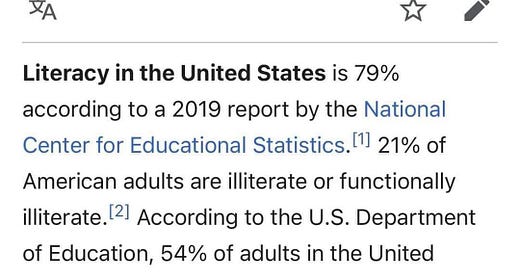Blaming the "Other"
No matter where you stand politically, directing blame at others seems to be a legitimate way to justify one's beliefs and to cite a cause for one or more social ills. Recent target: The "illiterate."
A recent thread on my Facebook page stopped me in my scrolling tracks: A friend shared a post with the following graphic:
These are troubling statistics with far-reaching implications in nearly every aspect of society. But the numbers in the graphic were not what ruffled my feathers. Rather, it was the elitist, simplistic, and uninformed comments from the Facebook rabble that led me to this post. (Note: The graphic above is attributed to The Economic Left, who gathered their information from this Wikipedia article.)
The overwhelming sentiment is that illiterate adults are responsible for many political and social woes; everything from Donald Trump, to Fox News, to the Proud Boys (from left-leaning folks) to illegal immigration, runaway crime, and abortion (from the right-leaning “jury.”) If people were “literate” (whatever that means), they would not do these things we dislike. What we really want is people who think like us, literate or not, not people with differing opinions, beliefs, or lifestyles.
To be clear, the “ability to use printed and written information to function in society, to achieve one's goals, and to develop one's knowledge and potential” 1 is a skill every citizen should have, but is denied to many. Having these skills would in theory reduce the incidence of the issues cited above. What it doesn’t mean is that the same literate folks would not vote for Donald Trump—educated people did—or that a literate person would not commit a crime—many do. Seeking a simplistic solution to a world you don’t like is one thing, but blaming a group of people for a multitude of complex problems is not where we want to start.
Many commenters believe the cause is laziness, stupidity, and lack of interest. Some come right out and say this, others couch their simplistic views in a word salad of dubious claims and head-spinning analogies, such as this gem: “For reference, Dune has a lexile score of 800 which is actually about a 5th grade level. With the recent movie that came out many people were saying they couldn't get through that book....” And your point here?
Instead, why don’t we consider the effects of undetected learning disabilities, uncorrected eyesight or hearing, mental illness, poor nutrition, cavities and gum disease, homelessness, physical and/or emotional abuse…you get the idea. All these challenges make it difficult to focus and learn, especially as an adult.
Varied and complex reasons contribute to many of the social problems we as a society must deal with. To boil the reason down to laziness and stupidity is not just elitist, it is violence. Violence because it effectively reduces any social or political incentives to find solutions, which involve allocating and directing time, energy, talent, and money to help those considered unworthy of these resources. Violence through neglect.
This! This is what I wanted to say, but couldn’t think of at the time:
The man who does not read has no advantage over the man who cannot read.
- Mark Twain
How many members of the Facebook horde spend significant time and effort determining if their opinion or knee-jerk reaction is valid? Few, I would guess. Admittedly, I have not always done my homework either, but this Farnham Street post is an awesome reminder.
So…I now step off my soapbox and leave you with this. I thought it fitting to indirectly recognize a female artist who has put her energy, celebrity status, and money into promoting children’s literacy.
"Framework -> Definition of Literacy". National Assessment of Adult Literacy. National Center for Education Statistics. Retrieved 25 September 2019.



